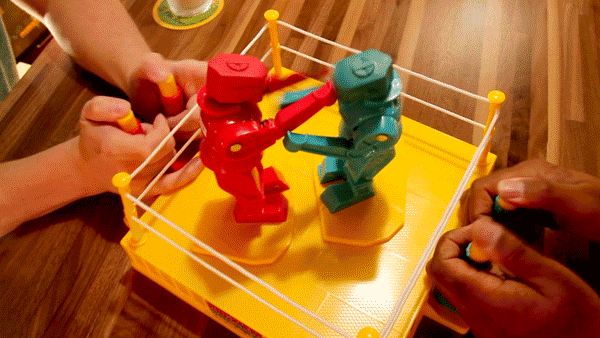
Let’s start by stating the obvious: The 2016 presidential election is causing everyone to experience colossal amounts of stress.
We’ve experienced the most divisive and heated election cycles in recent history and by all accounts it’s taken a big toll on our daily lives, our relationships and our mental health.
And, of course, there's data to back up what we all already know to be true.
America agrees!
A survey published by the American Psychological Association on Oct. 13 found that the 2016 election was “a very or somewhat significant source of stress” for 52 percent of American adults. And when it’s broken down by party, you see that both sides of the aisle are feeling it.
Broken down by generation, interestingly, the survey shows that Millennials and people 71 and older report feeling stress the most.
“I have quite a few clients who have anxiety already and it’s been exacerbated,” said Dr. Liz Chamberlain, a licensed psychologist with the University of Colorado Anschutz Health and Wellness Center. “Especially women who have experienced some discrimination or other experiences with sexism, it’s bringing up a lot of that for them … it’s triggering things they’d forgotten about.”
People are reporting not sleeping very well and experiencing more muscle tension, fatigue and irritability. One in four people report that election-related stress is distracting them at work.
So when this is all over tomorrow, when the decision has finally been made, how do we heal?
Historically, we’ve returned to normal pretty quickly.
Paul Teske, Dean of the School of Public Affairs at the University of Colorado Denver, said the time it takes for anger to subside and for things to return to normal is “not very long, especially if it’s not as super close or contested an election.”
The last time we had a highly contested election was in 2000, when the Supreme Court had to make a decision on an incredibly close race between George W. Bush and Al Gore and we all learned the term “hanging chad.”
Even then, Teske said, the tension eased pretty quickly after the Supreme Court made its ruling and Gore conceded.
“I think part of that, too, was Americans learning, ‘Gee, no election system is perfect, but what do you do with a ballot with hanging chads,’ and it’s hard to know what to do,” Teske said. “I do think the larger sense was that we need to move on, life goes on.”
And from a mental health standpoint, that’s the attitude we need and the attitude Chamberlain encourages in her clients (and, in this case, everyone).
“Our daily lives won’t be affected even though, with all the media and the rhetoric, we begin to think, 'Oh my god, my life is going to be over if this candidate is elected,'” she said.
“I think we recover fairly quickly … I think there will be some relief once it’s over -- the rhetoric and the hostility and the unknown.”
But the 2016 election has been especially rough.
Asked if he thinks this is the most divisive and heated election in recent history, Teske didn’t hesitate with a firm “yes.”
One reason for that, he said, is that the country has been gradually becoming more and more polarized. The other reason is Donald Trump.
“Donald Trump is an unusual candidate, and so many things that he’s done and said would disqualify another candidate,” Teske said. “And he’s been saying for more than a month that if he doesn’t win, it’s rigged, and that to me is completely unprecedented … I cannot remember ever another candidate saying the process is going to be wrong.”
That means we could see a little more lingering turmoil when this election is over, especially if Hillary Clinton wins.
“If it’s not very close, he can still say it’s rigged and whatnot,” Teske said. “I think most Americans, if they see she wins by four points nationally and a big win in the electoral college, which is what I think will happen, most Americans will say move on, but certainly hardcore Trump supporters will not.”
And if Trump wins?
“Should Donald Trump win, it’ll be a lot of shock given the polls,” he said, “and I don’t know, honestly. Having run the most divisive campaign I’ve ever seen, it’ll be interesting to see how he decides to govern … because he hadn’t told us a lot.”
And don’t forget the holiday stress on the horizon.
Thanksgiving is right around the corner from Election Day, which for many people only adds to the mounting stress. Chamberlain says more people typically seek help from a therapist or counselor in November because they experience anxiety over what issues might come up at family gatherings.
“The election has already caused conflict and it’s made it more worrisome for some people, sitting at the table with uncle Joe, who supports the other candidate,” she said.
So what happens after Election Day?
“In terms of the healing or how fast, I do think, in a normal situation, most people are not hyper-political and when it’s over, it’s over, and they accept the results and move on,” Teske said. “But I do think we have this huge wild card of Trump having said he may or may not accept the results and he’s talked about it being rigged, and how many supporters take that seriously and try to do something about it, whatever that may be.”
Even so, Teske believes that we’ll probably only see long-term effects in people who are particularly politically engaged -- people who live and breathe politics -- and the “cadre of intense people” who “may not dispute the results, but they try to do everything they can to stop that president from being effective.”
That starts at a grassroots level and travels up to the Congress, where we’d see similar partisan resistance that we saw against President Obama. Teske said that in the event of a Clinton win, we could be in for “four more years of getting nothing done and fighting on every issue.”
Be the leader we deserve
One thing to keep in mind, too, is that it’s up to everyone at that grassroots level to move past the rough and aggressive language. Leaf Van Boven, a professor of psychology at CU who studies political polarization, said our leaders likely won’t be the ones to do it.
"One thing we should keep in mind as ordinary citizens is that politicians don’t have an incentive to work on reconciliation,” he said. “They have an incentive to heighten the rhetoric and danger of the other side. That's a good strategy to get the vote out and a bad strategy to come together afterward."
Win or lose, how do you cope?
“The number one thing I tell people is really taking these breaks (from the news cycle),” Chamberlain said.
So turn off the TV and avoid social media. Talk to your friends about anything else. Go outside and get some exercise if you can. Go to the mountains or walk around your neighborhood. Just engage in any activity you find enjoyable, she said, and while you do it, engage your senses. It will ground you and reduce stress.
And when you do see friends and family who feel differently about the outcome than you do, find common ground.
"One of the key things is whether people can appeal to higher values, higher and shared values,” Van Boven said. “Everyone cares about being a good family person, being a good friend. In Colorado, most people care about the environment. The challenge will be to identify and act on those shared issues.”
Chamberlain had the same advice:
“No matter what your political views, finding whatever common problem exists, that will help create some common ground … and open you up to hearing another person’s concerns,” Chamberlain said. “And finding the things that you do enjoy and have in common, and appreciating that … expressing that can really heal a lot.”












